- Home
- Fredric Brown
The Screaming Mimi Page 22
The Screaming Mimi Read online
Page 22
“Could be. You hunting for her?”
Bline said, “No. Why should we? We could find her easily enough, just checking hotels. But from what Nick says, she’s all right, so it isn’t our business. If I thought she was wandering around in a daze from shock or something–”
“She didn’t go back home to get any clothes or anything?”
“No; our man’s still there and he’s to phone me if she shows back there. Guess that’s partly what she wanted money for, so she wouldn’t have to go back there and face the music.”
“Okay, Cap,” Sweeney said. “Thanks a lot.” He got back to his table just as the lobster arrived.
He ate it thoughtfully. He didn’t know exactly what he was being thoughtful about until the lobster had been reduced to a shell.
And then, suddenly, he knew what he had been thinking and it scared hell out of him.
CHAPTER NINETEEN
He didn’t hurry. His coffee came and he drank it slowly, still horrifying himself by what he was thinking. And then it got worse, for he found he wasn’t thinking it any more; he knew it. A lot of it was guesswork, but each guess dropped into place like a piece in a jigsaw puzzle that will fit nowhere else and at no other angle.
He paid the check and walked south to El Madhouse.
Nick saw him the moment he went in and came to meet him.
He said, “Hi, Sweeney. I’m worried; know anything about where Yo is, or if she’s coming tonight?” Sweeney said, “I’m worried, too. Listen, Nick, did you happen to notice when Yolanda left here whether she took a taxi?”
“No. She walked north.”
“How was she dressed?”
“In green, what they call a daytime dress. No coat or hat. And the dog was along, but not on a leash. Sometimes she has him on a leash, sometimes not. Say, it’s hell about Doc, isn’t it?”
“Yeah,” said Sweeney.
“And he threatened to kill you. You’re lucky, Sweeney.”
“Yeah,” said Sweeney.
He went outside and wondered how lucky he was going to be. It had been about five hours ago that Yolanda had left here. It was a break that she’d walked north, away from the Loop. In the Loop, it would have been impossible to trace her.
He was lucky. A block north, and thirty questions later, he found a newsboy who’d been at his stand all afternoon, and he’d seen Yolanda Lang; sure, he knew her.
By sight, he explained. She’d passed him and turned west on Ohio Street.
Sweeney turned west on Ohio Street.
It wasn’t too difficult. A gorgeous blonde in bright green, with a dog that looked like a fugitive from a James Oliver Curwood story. Within two blocks he found two people who had seen them.
In the third block, without turning off Ohio Street, he hit the jackpot. A tobacconist had not only seen girl and dog, he had seen them enter a building across the street – “the one right there, with the sign ‘Furnished Rooms’.” Sweeney entered the building with the sign that said “Furnished Rooms”.
Just inside the door was a bell and a sign that said “Ring for Landlady”. Sweeney rang for landlady.
She was big and slovenly; she had a mean eye. Sweet reasonableness wasn’t going to work, and she didn’t look as though she’d scare. Sweeney pulled out his wallet.
He took a twenty-dollar bill out of it, she could see the figure in the corner. He said, “I’d like to talk to the girl who took a room late this afternoon. The one with the dog.” She didn’t even hesitate in reaching for the bill. It disappeared into the neckline of her dress, into a bosom so redundant that Sweeney wondered if she’d be able to find a bill without searching. She said, “She took a room on the second floor – the door right opposite the head of the stairs.” Sweeney said, “Thanks.” He took another bill, of the same denomination, from his wallet. She reached for that one, too, but he didn’t give it to her. He said, “I’m rather curious to know the circumstances; what she told you and what she’s done since she came here.”
“What do you want with her? Who are you?” Sweeney said, “Okay, it doesn’t matter. I’ll just go up and talk to her.” He started to put the second twenty back into his wallet.
She said, very quickly, “She came here late this afternoon and wanted a room. I said we didn’t take dogs and she said she’d pay extra if I did and that the dog was well behaved, so I gave her the room. She didn’t have any baggage. Not even a coat or hat.”
“How long did she say she’d be staying?”
“She didn’t know. But she said she’d pay for a full week no matter how short a time she stayed.”
“How much did she pay you?”
She hesitated. “Twenty dollars.”
Sweeney looked at her. He thought, you bitch. And you sell her out for another twenty. Aloud, he asked, “And since then?”
“She went out and left the dog in her room. She came back with a lot of packages. Then she took the dog down for a walk, on a leash; she hadn’t had one on him before. And she was disguised; she had on a black wig and shell-rimmed glasses and a different dress. You’d have hardly knowed her.”
“Was it a wig or a dye job?”
“A dye job couldn’t have dried that quick.”
“Anything else you can tell me about her?” She thought for a moment, but shook her head.
Sweeney held out the second bill, holding it carefully so his hand wouldn’t be touched by hers. He watched its course into her capacious bosom and thought that for forty dollars he wouldn’t reach down there to take his two twenties back.
Something in his expression made her take a step backwards.
And that was fine; Sweeney didn’t want to have to brush against her as he went by and up the stairs. Halfway up, he heard her door slam. For forty dollars, she didn’t care what he wanted with her new guest. Sweeney wished he hadn’t given her any money; he could have got most of that information out of her anyway. He felt ashamed of himself for having taken the easy way.
And then he stood in front of the door on the second floor at the head of the stairs, and he quit thinking about the landlady who’d directed him there.
He tapped gently at the door.
There was a rustle of movement within, and it opened a few inches. Wide eyes stared at him through shell-rimmed glasses, under black hair. But the eyes themselves he’d seen before, and often. They’d stared at him blankly through the glass of a door on State Street on a night that seemed many years ago. They’d looked at him across a table at El Madhouse. They’d looked at him from the El Madhouse stage.
And they’d looked at him from the face of a small black statuette that screamed as silently as its model had screamed noisily.
Sweeney said, “Hello, Bessie Wilson.”
Her eyes widened and she gasped. But she stepped back and Sweeney walked in.
It was a small room, and dingy. It contained a bed, a dresser and a chair, but Sweeney didn’t notice them. To Sweeney, the room seemed full of dog. Even though the landlady had talked about the dog, even though he himself had been thinking about it and had traced Yolanda through it, he had somehow managed to overlook the fact that Devil would be here.
But Devil was. He crouched, ready to spring at Sweeney’s throat. The sound that came from deep in Devil’s chest was that ominous buzzsaw sound that Sweeney had heard once before.
Yolanda said, “Quiet, Devil. Guard him.” She had closed the door.
Sweeney felt something wet on his forehead. He felt something cold crawling down his back. It came to him now that he had been so interested in solving a problem that he had completely forgotten the personal danger its solution would place him in.
He stared at Yolanda Lang – at Bessie Wilson.
Even with the black wig, with the glasses, she was incredibly beautiful. Her only visible garment was a house-coat; under it, her feet were bare. The housecoat had a long zipper down the front.
Sweeney wondered if – and then realized he didn’t have time to wonder. He’d better say s
omething, anything.
He said, “I finally figured it out, Bessie, except a few details. The doctor or psychiatrist from the sanitarium near Beloit, the one who took an interest in your case after – after what happened to you at Brampton. That must have been Doc Greene – wasn’t it?”
He’d have felt better if she’d answered – even to say, uselessly, that she didn’t know what he was talking about – but she didn’t speak.
She took off the glasses and the wig and put them on the dresser beside the door. She shook her head and her blonde hair fell again into the page-boy bob. She regarded him gravely – but silently.
Sweeney’s throat felt dry. He had to clear it before he could talk. He said, “It must have been Greene, whether he was using that name then or not. And he fell madly in love with you. Literally madly – so insanely that he ran out on his career to be with you. Or did he get into some trouble that made him have to leave his profession anyway?
“Did you know that he sent your brother a letter telling him that you had died? He did; Charlie thinks you’re dead. But Greene must have signed papers to get you out, and then quit his job to bring you to Chicago.
“He must have thought he’d cured you as nearly as you could be cured. He must have known that you’d never be fully sane, but figured that, as a psychiatrist, he could handle you and control you. And he could and did, I guess – until something that he didn’t know about set you off. He was a pretty brilliant guy, Yolanda. I’ll bet he did the choreography for that dance you and the dog do. And it’s good, damned good. I wondered for a while why he didn’t get you better bookings – but it must have been because he didn’t dare risk letting you become really famous, under the circumstances. He kept you in the small time deliberately – as deliberately as he covered his real relationship to you, as doctor and patient, by becoming a bona fide agent and getting other clients.”
Sweeney cleared his throat again, hoping she’d say something.
She didn’t. She just looked at him. And the dog looked at him yellowly, ready to spring at the slightest word or signal from its mistress – or at the slightest move from Sweeney.
He said, “And you were all right until that day, two months ago, when you happened to go into Raoul’s gift shop and bought that statuette from Lola Brent. Did you recognize that statuette, Yolanda?”
He thought she might answer that. She didn’t.
He took a deep breath and the dog began to growl because his shoulders had moved. Sweeney stood very still and the dog quit growling.
He said, “Your brother Charlie made that statuette, Bessie. You were the model for it. It expressed, pretty perfectly, what you felt when – when the thing that drove you insane happened. Whether you recognized yourself in the statuette and knew that it was Charlie’s work, I don’t know. But seeing that statuette undid everything Doc Greene had done for you.
“Only there was a transference. Seeing yourself – in that statuette – as a victim, seeing yourself in that state from the outside, you became, in your mind, the attacker. The killer with the knife.
“And the woman from whom you bought the statuette was a beautiful blonde, and your mania fixed on her. You went out and bought a knife and waited, with it in your purse, until she left to go home. And because she was fired, it wasn’t a long wait. You followed her home and killed her – as the ripper in Brampton would have killed you if Charlie hadn’t hot him. So–”
There wasn’t anywhere to go from the “So–” and it hung there. When it got tired of hanging there, Sweeney said,
“You took the statuette home and – did you make a fetish of it, Yolanda? It must have been something like that. Did you worship it, with a ritual that involved a knife? Or what?” No answer yet, and he thought her eyes were starting to glaze a little, staring at him. He went on talking because he was afraid of what would happen when he stopped.
“And you killed twice more. Each time, a beautiful blonde. Each had passed your place on State Street just before she was killed. I’d guess that each time was just after some mystical ritual with the statuette after which you went down to the street and followed – and killed – the first woman who went by and who was blonde and beautiful, who fitted your fixation.
“And it wasn’t until after that third killing that Doc Greene suddenly found out, or suddenly realized, that it was you who’d been doing them. He didn’t know about the statuette then, but somehow he learned or realized who the Ripper was. And it scared him stiff. He would have been in a beautiful mess if the truth came out. They’d merely put you in an institution again, but Doc – I don’t know exactly what grounds they’d get him on, but they’d get him plenty; they’d throw the book at him. So he tried something pretty desperate. Did you know it was he who attacked you that night, Yolanda?”
If she’d only answer–
He said, “Doc tried a really heroic cure. Shock treatment. He thought being attacked again might reverse your fixation – at least put you back into the type of insanity you had before. And anything would be better than having you homicidal. He probably figured he could handle anything short of homicidal insanity.
“So he attacked you that night in the hallway. Of course he wouldn’t have used an ordinary knife or razor – because he didn’t want to hurt you physically. What he used would have been a piece of wood, say, with a razor blade projecting out only an eighth of an inch or less, so it would make just a surface cut. And unorthodox as his psychiatry was, it worked – up to a point. If he’d known, then, about the statuette and had hunted it up in your apartment while you were in the hospital, you might not have gone haywire again.
“But he didn’t know about the statuette until after I broke the story in today’s paper. He must have had a hunch all along that I was going to crack this thing, though, because he kept in touch with me, pretending he was interested in getting the Ripper caught so you’d be safe from another attack. We had a lot of fun, Doc and I. I’m sorry he’s–” Sweeney took a deep breath. He said, “But when Doc read today’s paper, he learned about the statuette and saw that it was what had set you off. So he decided to get it away from you right away. He went up to your flat this afternoon with an empty box that would hold it. He didn’t want to be seen carrying a package out that he hadn’t brought in; he didn’t want anyone who might be watching your place to wonder what was in the package. He was still gambling his life to save you, and this time he lost.
“He found the statuette – in your dresser or closet or wherever you kept it – and the knife with it. He had both of them in his hands, and the sight of him touching your fetish threw you into – well, you sicked Devil on him, and Devil killed him.”
Sweeney glanced down at Devil, and wished he hadn’t.
He looked back at Bessie Wilson. He said, “You didn’t know for sure whether he was dead or not, down there in the courtyard, and didn’t know what he’d tell the police if he wasn’t, so you ran. But he didn’t tell on you, Yolanda. Instead – because he knew he was dying – the damn fool took the rap for you; he said he was the Ripper. He must have thought, or at least hoped, that once the statuette was broken and you didn’t have it any more, you’d be all right again, even without him.’
He stared at her and opened his mouth to ask the sixty-five dollar question – Are you? Are you all right now?
But he didn’t have to ask it, because the answer was there, in her eyes.
Madness.
Her right hand fumbled for the tab of the zipper of her housecoat, found it, zipped downward. It fell down in a circle about her bare feet. Sweeney caught his breath a little, just as he had that night when he had looked through the glass into the hallway.
Reaching behind her, she opened the top left drawer of the dresser, felt inside it. Her hand came out holding a knife, a brand-new eight-inch carving knife.
A nude high priestess holding the sacrificial knife.
Sweeney sweated. He started to raise his hands and the dog growled and crouched before he’d
moved them an inch. He quit moving them.
He made his voice quiet and steady. “Don’t, Yolanda. I’m not the one you want to kill. I’m not blonde or beautiful. I’m not a prototype of Bessie Wilson who was attacked by a maniac–”
He was watching her eyes and it came to him that she didn’t understand a word he was saying by now, that the connection had broken, just when he did not know. Yet she had started a step forward when he had stopped speaking and had stood still, the knife in her hand and ready – but words, the sound of his voice, had arrested her in midstep. Words, not what he said, but the fact that he was talking–
Her foot was moving again, the knife coming up.
Again Sweeney took the mere ghost of a backward step, and again the dog growled and crouched to spring at his throat.
“Four score and seven years ago,” Sweeney said, “our fathers brought forth on this continent a new nation, conceived in liberty and dedicated to the proposition that all men are created equal...”
Yolanda stood still again, an almost cataleptic stillness.
Sweat was running down Sweeney’s sides, from his armpits. He said, “Now we are engaged in a great civil war, testing whether – uh – that nation – That’s all I remember. Mary had a little lamb; its fleece was white as snow...” He finished Mary and the lamb, hit high spots of the Rubaiyat, Hamlet’s soliloquy. After a while he remembered that he could repeat himself, and after another while he found that – if he did it a sixteenth of an inch at a time – he could ease his way back toward the wall behind him and, finally, lean against it.
But he couldn’t move, even a sixteenth of an inch, toward the door or toward Yolanda. He couldn’t raise his hands.
And after a time – a long time – his voice was so tired he couldn’t talk any more. But he kept on talking anyway. If he stopped talking for as much as ten seconds he was going to die.
Sweeney could tell from the one small window of the room, on the side opposite from the wall he leaned against that it was dark outside. Years later a clock somewhere tolled midnight. Centuries after that, the window began to get light again.

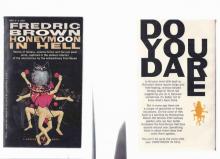 Hall of Mirrors
Hall of Mirrors Honeymoon in Hell
Honeymoon in Hell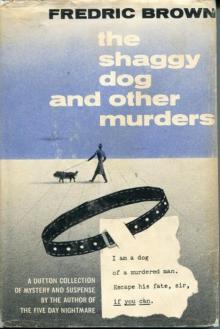 The Shaggy Dog and Other Murders
The Shaggy Dog and Other Murders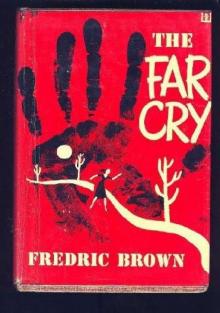 The Far Cry
The Far Cry Arena
Arena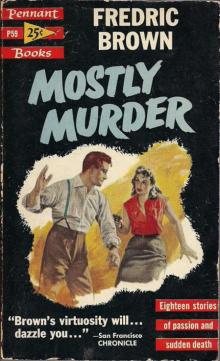 Mostly Murder
Mostly Murder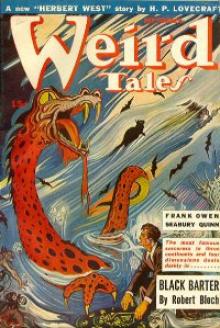 The Geezenstacks
The Geezenstacks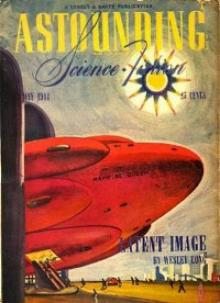 The Yehudi Principle
The Yehudi Principle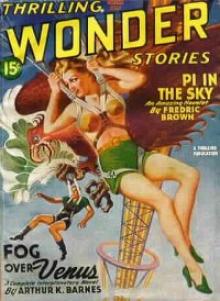 Pi in the Sky
Pi in the Sky Eine Kleine Nachtmusik
Eine Kleine Nachtmusik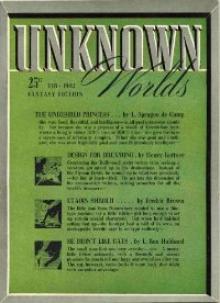 Etaoin Shrdlu
Etaoin Shrdlu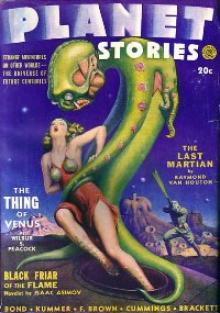 The Star Mouse
The Star Mouse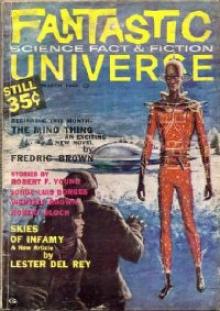 The Mind Thing
The Mind Thing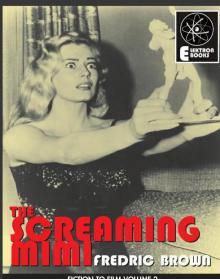 The Screaming Mimi
The Screaming Mimi The Fabulous Clipjoint
The Fabulous Clipjoint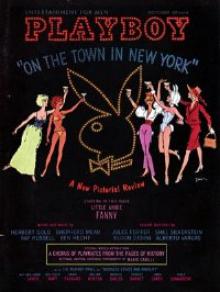 Puppet Show
Puppet Show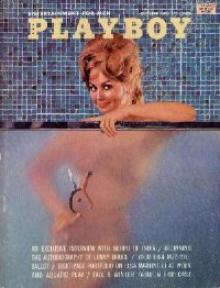 It Didn't Happen
It Didn't Happen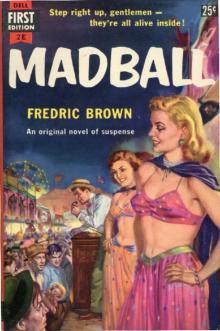 Madball
Madball Happy Ending
Happy Ending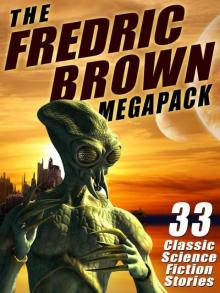 The Fredric Brown Megapack: 33 Classic Science Fiction Stories
The Fredric Brown Megapack: 33 Classic Science Fiction Stories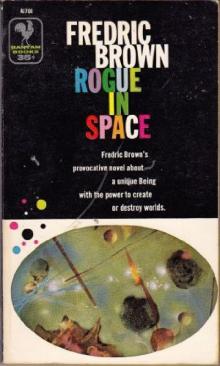 Rogue in Space
Rogue in Space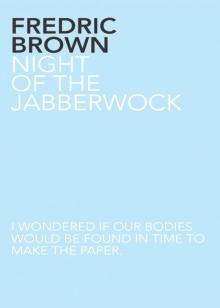 Night of the Jabberwock
Night of the Jabberwock The Dead Ringer
The Dead Ringer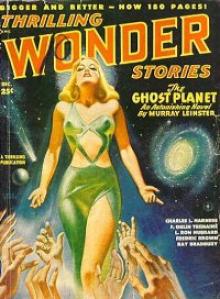 Knock
Knock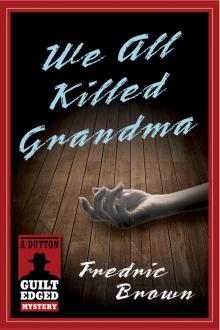 We All Killed Grandma
We All Killed Grandma Space On My Hands
Space On My Hands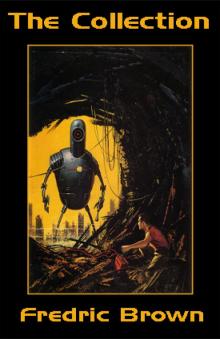 The Collection
The Collection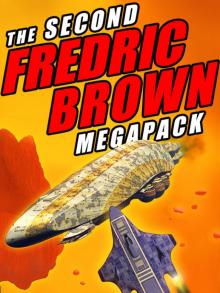 The Second Fredric Brown Megapack: 27 Classic Science Fiction Stories
The Second Fredric Brown Megapack: 27 Classic Science Fiction Stories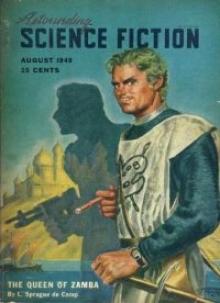 Letter to a Phoenix
Letter to a Phoenix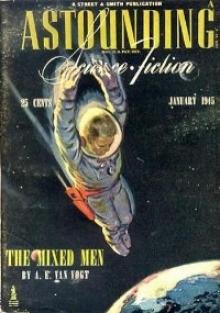 The Waveries
The Waveries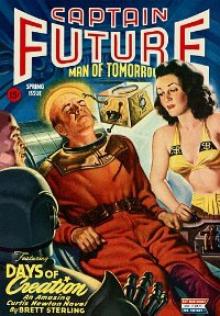 Nothing Sirius
Nothing Sirius The Deep End
The Deep End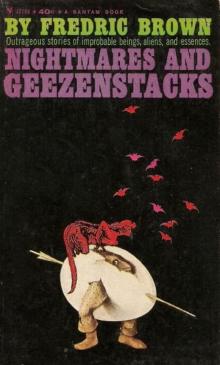 Nightmares & Geezenstacks
Nightmares & Geezenstacks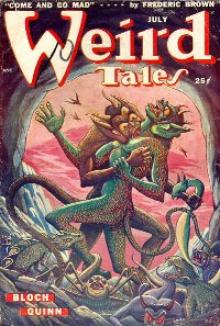 Come and Go Mad
Come and Go Mad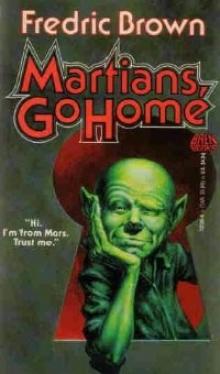 Martians, Go Home
Martians, Go Home